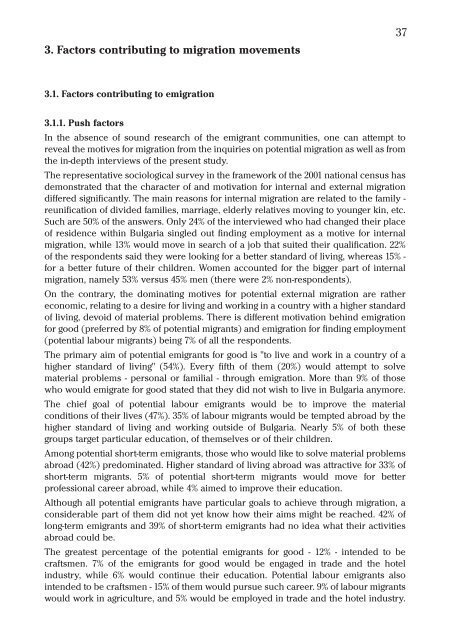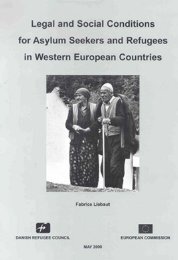Bulgaria - The social impact of seasonal migration
Bulgaria - The social impact of seasonal migration
Bulgaria - The social impact of seasonal migration
Create successful ePaper yourself
Turn your PDF publications into a flip-book with our unique Google optimized e-Paper software.
3. Factors contributing to <strong>migration</strong> movements<br />
3.1. Factors contributing to e<strong>migration</strong><br />
3.1.1. Push factors<br />
In the absence <strong>of</strong> sound research <strong>of</strong> the emigrant communities, one can attempt to<br />
reveal the motives for <strong>migration</strong> from the inquiries on potential <strong>migration</strong> as well as from<br />
the in-depth interviews <strong>of</strong> the present study.<br />
<strong>The</strong> representative sociological survey in the framework <strong>of</strong> the 2001 national census has<br />
demonstrated that the character <strong>of</strong> and motivation for internal and external <strong>migration</strong><br />
differed significantly. <strong>The</strong> main reasons for internal <strong>migration</strong> are related to the family -<br />
reunification <strong>of</strong> divided families, marriage, elderly relatives moving to younger kin, etc.<br />
Such are 50% <strong>of</strong> the answers. Only 24% <strong>of</strong> the interviewed who had changed their place<br />
<strong>of</strong> residence within <strong>Bulgaria</strong> singled out finding employment as a motive for internal<br />
<strong>migration</strong>, while 13% would move in search <strong>of</strong> a job that suited their qualification. 22%<br />
<strong>of</strong> the respondents said they were looking for a better standard <strong>of</strong> living, whereas 15% -<br />
for a better future <strong>of</strong> their children. Women accounted for the bigger part <strong>of</strong> internal<br />
<strong>migration</strong>, namely 53% versus 45% men (there were 2% non-respondents).<br />
On the contrary, the dominating motives for potential external <strong>migration</strong> are rather<br />
economic, relating to a desire for living and working in a country with a higher standard<br />
<strong>of</strong> living, devoid <strong>of</strong> material problems. <strong>The</strong>re is different motivation behind e<strong>migration</strong><br />
for good (preferred by 8% <strong>of</strong> potential migrants) and e<strong>migration</strong> for finding employment<br />
(potential labour migrants) being 7% <strong>of</strong> all the respondents.<br />
<strong>The</strong> primary aim <strong>of</strong> potential emigrants for good is "to live and work in a country <strong>of</strong> a<br />
higher standard <strong>of</strong> living" (54%). Every fifth <strong>of</strong> them (20%) would attempt to solve<br />
material problems - personal or familial - through e<strong>migration</strong>. More than 9% <strong>of</strong> those<br />
who would emigrate for good stated that they did not wish to live in <strong>Bulgaria</strong> anymore.<br />
<strong>The</strong> chief goal <strong>of</strong> potential labour emigrants would be to improve the material<br />
conditions <strong>of</strong> their lives (47%). 35% <strong>of</strong> labour migrants would be tempted abroad by the<br />
higher standard <strong>of</strong> living and working outside <strong>of</strong> <strong>Bulgaria</strong>. Nearly 5% <strong>of</strong> both these<br />
groups target particular education, <strong>of</strong> themselves or <strong>of</strong> their children.<br />
Among potential short-term emigrants, those who would like to solve material problems<br />
abroad (42%) predominated. Higher standard <strong>of</strong> living abroad was attractive for 33% <strong>of</strong><br />
short-term migrants. 5% <strong>of</strong> potential short-term migrants would move for better<br />
pr<strong>of</strong>essional career abroad, while 4% aimed to improve their education.<br />
Although all potential emigrants have particular goals to achieve through <strong>migration</strong>, a<br />
considerable part <strong>of</strong> them did not yet know how their aims might be reached. 42% <strong>of</strong><br />
long-term emigrants and 39% <strong>of</strong> short-term emigrants had no idea what their activities<br />
abroad could be.<br />
<strong>The</strong> greatest percentage <strong>of</strong> the potential emigrants for good - 12% - intended to be<br />
craftsmen. 7% <strong>of</strong> the emigrants for good would be engaged in trade and the hotel<br />
industry, while 6% would continue their education. Potential labour emigrants also<br />
intended to be craftsmen - 15% <strong>of</strong> them would pursue such career. 9% <strong>of</strong> labour migrants<br />
would work in agriculture, and 5% would be employed in trade and the hotel industry.<br />
37

















